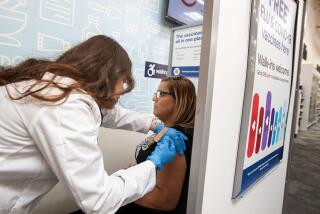Meningitis’ Risk Can Be Reduced
- Share via
In an age of antibiotics and immunizations, most doctors are fairly confident about their ability to prevent and treat many infectious diseases. But one particular infection that is both preventable and treatable--meningitis--still strikes fear in the minds of doctors.
This infection is especially worrisome largely because of its location. Meningitis is an infection of the membranes (called meninges) that surround the brain and spinal cord. The infection can start innocuously but very quickly turn into a life-threatening illness.
The illness typically starts with what appears to be a common and simple bacterial or viral infection of the nose or throat. Like almost all such infections, there may be cold-like symptoms, a mild sore throat or a cough--or there may be no symptoms at all. The problem begins when the bacterium or virus responsible for the illness enters the bloodstream and spreads to the meninges. Then the picture changes dramatically.
In adults, the most common signs of an infection involving the meninges are fever, headache, neck stiffness, nausea and vomiting. Confusion and drowsiness may also occur, and bright lights may hurt the eyes. In infants and small children, however, these classic signs of meningitis may be absent or difficult to detect. The only early signals that a serious infection is developing may be nonspecific ones like irritability, tiredness or poor feeding.
Although the symptoms of bacterial and viral meningitis are similar, their treatment and prognosis are quite different. Bacterial meningitis--the more serious of the two--requires treatment with antibiotics, usually administered intravenously in a hospital.
Bacterial meningitis is also associated with a significant risk of serious complications; about 10% of people who develop meningococcal meningitis die, and another 10% suffer severe complications including hearing loss and mental retardation.
Viral meningitis, however, usually improves with remedies such as acetaminophen or ibuprofen, used to reduce fever and relieve headache. It is rarely fatal in healthy individuals, and the vast majority of patients will recover completely.
Although meningitis is much less contagious than the common cold or flu, it can be spread from one person to another, typically through contact with infected oral secretions such as saliva or sputum (because the infection actually begins in the nose and throat). That’s why people living in crowded conditions like college dormitories and military barracks have an increased risk of contracting meningitis. Some forms of viral meningitis are spread through contact with infected fecal material.
Fortunately, some preventive measures can be taken, particularly against the bacterial form of meningitis. Vaccines are available against three of the bacteria most commonly responsible for causing meningitis: Neisseria meningitides, Streptococcus pneumoniae and Haemophilus influenza.
Unfortunately, there is no way to completely prevent the development of meningitis. The vaccines do not protect against all forms of the bacteria and do not confer perfect protection against the forms they do cover.
Experts believe, however, that the number of cases--and the complications resulting from those cases--could be dramatically reduced with proper immunization under the current guidelines and with prompt recognition and treatment of disease when it does develop.
Pneumococcal vaccine protects against meningitis caused by Streptococcus pneumoniae, which is the leading cause of bacterial meningitis in the United States. Until recently, vaccination was recommended only for older adults and children over age 2 and young adults at high risk of serious infection by the pneumococcal bacteria. (Because the vaccine did not offer protection to young children, it was not recommended before age 2.) However, a relatively new vaccine is available that is safe and effective in babies.
The American Academy of Pediatrics recommends routine immunization with three doses of the vaccine at two months, four months and six months, and a booster shot between 12 and 15 months. The vaccine is also recommended for children 24 months to 59 months of age who are at high risk of serious infection from the pneumococcal bacteria, including children with sickle cell disease and HIV infection, as well as children whose immune systems are compromised. Recent vaccine shortages have prompted some modifications to this immunization schedule that aim to make the vaccine available to children at the greatest risk.
Because older people and individuals with weakened immune function are more vulnerable to pneumococcal meningitis, vaccination (with the “old” vaccine) is still recommended for men and women 65 and up, children over 2 and young adults considered to be at risk. This includes, for example, individuals with chronic cardiovascular, pulmonary or liver disease, diabetes, alcoholism or poorly functioning immune systems. People living in nursing homes and other long-term care facilities should also be vaccinated.
Meningococcal vaccine protects against meningitis caused by Neisseria bacteria. Although young children have a higher risk of this infection, the vaccine currently available does not offer them significant protection and is not part of the regular childhood immunization schedule.
Routine vaccination should, however, be considered by other at-risk groups, including college freshmen living in dormitories and military personnel. (Several recent studies found the risk of disease to be higher among college students living in dorms than among students residing in other types of accommodations.)
Hib vaccine is designed to protect against a bacterium called Haemophilus influenzae type B. Before an effective vaccine was introduced, H. flu was the leading cause of bacterial meningitis--one in 200 children would develop a serious H. flu infection by age 5, and 60% of them would develop meningitis. The Hib vaccine is now part of the routine childhood immunization schedule, starting at 2 months. The incidence of H. flu meningitis has fallen dramatically since its introduction.
*
Dr. Jonathan Fielding is the director of public health and the health officer for the Los Angeles County Department of Health Services. Dr. Valerie Ulene is a board-certified specialist in preventive medicine practicing in Los Angeles. Their column appears the second and fourth Mondays of the month. Send questions by e-mail to our [email protected]. They cannot respond to every query.





